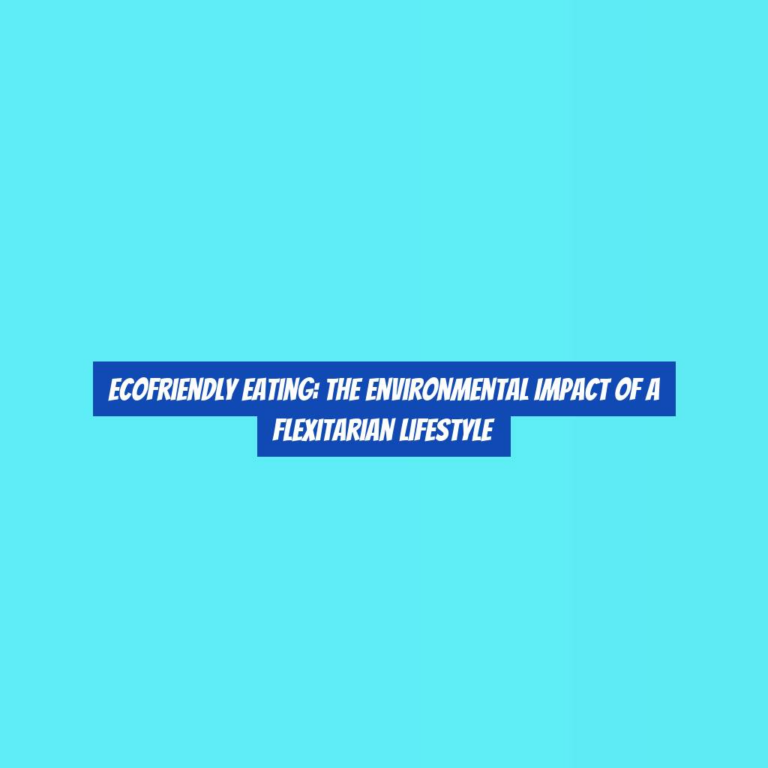Green Choices: How Flexitarianism Positively Impacts the Environment
Making mindful meal choices can make a meaningful impact on the environment. Have you ever considered how flexitarianism, a diet that emphasizes plant-based foods while allowing occasional meat consumption, could contribute to a cleaner, greener planet?
The potential benefits are not only significant but also sustainable. By adopting a flexitarian approach, you can help reduce greenhouse gas emissions, conserve water resources, and minimize environmental impact.
But thatG??s just the beginning. Keep reading to discover the multifaceted ways in which flexitarianism positively impacts the environment and why itG??s gaining traction as a green choice for many.
Reducing Greenhouse Gas Emissions
To reduce greenhouse gas emissions, you can make simple changes in your daily habits and lifestyle. One effective way is to reduce meat consumption by incorporating more plant-based meals into your diet. Livestock farming, especially beef and lamb, produces significant amounts of methane, a potent greenhouse gas. By choosing to have meatless meals a few times a week, you can help reduce the demand for animal products and contribute to lower greenhouse gas emissions.
Additionally, consider reducing food waste, as decomposing organic matter in landfills produces methane. Planning meals, buying only what you need, and properly storing food can help minimize waste.
Another way to cut down on emissions is by using alternative modes of transportation. Walking, biking, carpooling, or using public transportation whenever possible can significantly reduce your carbon footprint. If you need to drive, consider using a fuel-efficient or electric vehicle.
You can also save energy at home by using energy-efficient appliances, unplugging electronics when not in use, and properly insulating your home.
Making these adjustments in your daily life can lead to a meaningful reduction in greenhouse gas emissions.
Conserving Water Resources
How can you reduce water consumption in your daily life while contributing to the conservation of water resources?
One simple way to conserve water is by being mindful of your daily habits. Turn off the faucet while brushing your teeth or scrubbing dishes, and fix any leaky taps promptly.
Another effective method is to upgrade to water-efficient appliances, such as low-flow showerheads and toilets. These small changes can make a significant impact on your overall water usage.
Additionally, consider collecting rainwater for activities like watering plants or washing your car. This not only reduces your reliance on treated water but also helps to prevent stormwater runoff.
When it comes to outdoor water usage, opt for drought-resistant plants in your garden and use mulch to retain soil moisture.
Furthermore, be conscious of your diet choices, as it takes a significant amount of water to produce meat and dairy products. By incorporating more plant-based meals into your diet, you can indirectly reduce your water footprint.
Making these conscious choices in your daily life can contribute to the conservation of water resources and help protect this essential natural resource for future generations.
Preserving Natural Habitats
Preserving natural habitats is essential for maintaining biodiversity and ensuring the survival of countless species. By choosing to support efforts aimed at conserving natural habitats, you play a crucial role in protecting the delicate balance of ecosystems.
When natural habitats are preserved, it allows species to thrive in their native environments without disruption. This, in turn, helps maintain the intricate web of interactions between different organisms, ensuring the stability of ecosystems.
When natural habitats are destroyed or degraded, it not only affects the species that call these habitats home, but also has far-reaching consequences for the environment as a whole. It disrupts the food chain, reduces genetic diversity, and can lead to the extinction of species.
Minimizing Environmental Impact
You can reduce your environmental impact by making conscious choices in your daily life. Here are five simple ways to minimize your impact on the environment:
-
Reduce meat consumption: Cutting back on meat consumption, especially red meat, can significantly reduce your carbon footprint. Consider participating in meatless Mondays or incorporating more plant-based meals into your diet.
-
Choose sustainable transportation: Opt for walking, biking, carpooling, or using public transportation whenever possible. This can help reduce greenhouse gas emissions and alleviate the strain on natural resources.
-
Conserve water: Be mindful of your water usage by fixing leaks, taking shorter showers, and using water-saving appliances. Conserving water helps preserve this precious resource and reduces energy consumption.
-
Minimize single-use plastics: Avoid single-use plastics such as bags, bottles, and utensils. Opt for reusable alternatives to reduce plastic pollution and minimize the environmental impact of disposable products.
-
Support eco-friendly products: Purchase products with minimal packaging, made from recycled materials, or with eco-friendly certifications. By supporting sustainable products, you can encourage responsible production and consumption practices.
Promoting Sustainable Food Consumption
When promoting sustainable food consumption, itG??s essential to consider the environmental impact of food choices and prioritize options that minimize harm to the planet.
-
Opt for locally sourced and organic produce whenever possible. Locally sourced food reduces the carbon footprint associated with transportation, and organic farming practices minimize the use of synthetic pesticides and fertilizers that can harm ecosystems.
-
Additionally, choose plant-based options over meat and dairy products. The production of plant-based foods generally requires fewer resources and produces lower greenhouse gas emissions compared to animal products.
-
When purchasing seafood, opt for sustainably sourced options to support responsible fishing practices and preserve marine ecosystems.
-
Another way to promote sustainable food consumption is to minimize food waste. Plan meals, store food properly, and compost food scraps to reduce the amount of organic waste sent to landfills.
Conclusion
In conclusion, choosing a flexitarian lifestyle can have a positive impact on the environment. By reducing your consumption of meat and incorporating more plant-based foods into your diet, you can help reduce greenhouse gas emissions, conserve water resources, and preserve natural habitats.
Making green choices and promoting sustainable food consumption can make a significant difference in minimizing your environmental impact.
So, keep making those green choices and continue to positively impact the environment!






